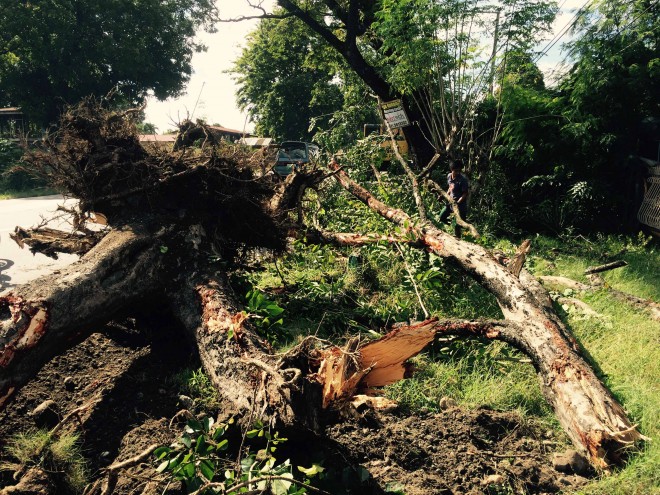
The mangled trunk of a newly cut narra tree on Thursday lies on the shoulder of the Manila North Road in Barangay Rosario in Pozorrubio town in Pangasinan province. The tree was one of several trees along the Manila North Road cut by a contractor to give way to a road widening project. GABRIEL CARDINOZA / Inquirer Northern Luzon
POZORRUBIO, Pangasinan–-The cutting of trees along the Manila North Road (MNR) in Pozorrubio and Binalonan towns in Pangasinan resumed last week, with at least six trees already felled by contractors of a road widening project, the INQUIRER learned Thursday.
“We already have a tree cutting permit,” a backhoe operator told the INQUIRER here. The operator, who declined to give his name, said he has been cutting trees here since Saturday.
But a Department of Environment and Natural Resources (DENR) official, who asked not to be identified in this report, said he did not know of any tree cutting permit that his agency had issued.
A copy of a memorandum from Environment Undersecretary Demetrio Ignacio Jr., dated July 21, granted clearance to the DENR regional director to issue a special tree cutting permit to the Department of Public Works and Highways (DPWH).
Narchito Arpilleda, DPWH district office spokesperson, said the DENR issued a special tree cutting permit on Aug. 20.
The DENR memorandum, however, clarified that the cutting permit, when issued, will only cover the cutting of 158 dead and 28 dying trees along the MNR.
The dead and dying trees are among the 770 trees left standing after the DPWH’s tree cutting permit (issued in November 2013) expired in February 2014. The trees did not survive after they were girdled, a process where a patch of bark around the trunk is removed to prevent nutrients from circulating within the tree.
The DPWH had applied for a new permit, but non-government organizations (NGOs) asked a court in Urdaneta City to issue a temporary environmental protection order (Tepo) to save the trees. The court is still hearing the case.
Ignacio’s memorandum also required the DPWH to hold meetings and public consultations with concerned local governments, NGOs, and other groups in the area to discuss the urgency of the tree cutting.
“Prior to tree cutting operations, placards or signboards [measuring] 4 feet by 8 feet should be installed at conspicuous places to inform the public that tree cutting operations are authorized by the DENR,” the memorandum said.
It also said the cutting operations shall, at all times, be under the strict supervision of DENR officials.
Arsenia Gaduang, 62, a resident of Barangay Rosario here, said she was surprised to see her family’s fruit-bearing mango tree lying along the road on Sunday, with its branches and leaves strewn all over the place.
“It was standing on Sunday. We just went to the beach and when we came home, it’s gone,” said Gaduang.
A narra tree standing about 10 meters away from the mango tree was felled on Monday, Gaduang added.
“We thought they will no longer cut it because last July, they pruned it and they told me they will not cut it,” she said.
Virginia Pasalo, trustee of the Women in Development Foundation and one of those who asked the court to stop the tree cutting, said the old trees along the highway were victims of a “massacre.”
“[These trees were] trying to resuscitate themselves from the attempted murder not so many months ago. They are already breathing and moving away from intensive care, and the angels of death have dealt them the final blow. It is heartless; it is an act of the devil,” Pasalo said. JE